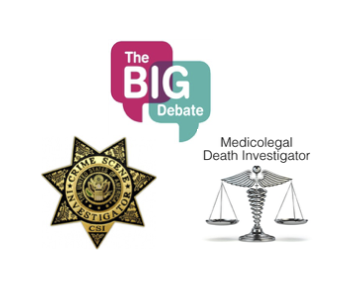Warning:
“This episode may be seen as confrontational ! The views expressed in this podcast are 100% the views of its host and producer of the show, and in every way is intended to bring change and viewpoints guiding the current coroner system of the United States.
It is not however, intended to discredit any one individual or agency, and all comments are designed to be constructive and thought provoking”
The Debate
Much has been said about the need for proper accreditation of Coroners and Coroner Investigators. The whole ‘abolishing the coroner system’ debate seems to never end. But the final answer to the debate is to require more certification and oversight into coroners and the investigators they employ. The big question however, and one no one has any real answers for, is how will this be funded. If government wants to bring up the level of education in the death investigation field; state and local governments are going to have to start putting a better emphasis on the funding of the programs and training.
In addition to funding training and certifications, local governments must increase the salary base for coroners and investigators. The old saying ‘you get what you pay for’ is not always factual – yet most times it is truer than not. County governments simply can not continue to pay sub-standard wages to coroners and expect to attract the ‘best’ candidates for the job.
American Board of Medicolegal Death Investigators (ABMDI)
Also in this episode I talk with Matthew Lunn – VP of ABMDI about the need for accreditation and what role ABMDI plays in filling the gap in certifications and accrediting death investigators. We also talk about the 2020 expectations of National standards for death investigators and Coroner offices.
More about ABMDI and Matthew Lunn can be found at abmdi.org

coroner,police training, darren dake,sheriff,deputy,coroner association,murder scenes,auto fatalities,csi,first responders,autoerotic fatalities,become a coroner,forensic science crime scene investigation,forensic science crime,scene investigator,forensic training,forensics training,how to be a crime scene investigator,how to become a death investigator,how to become a medical examiner,how to become a medical examiner investigator,medical examiner investigator training,medical investigator training,medicolegal death,medicolegal death investigator training,murder scenes,pictures of murder scenes,murder,real murder crime scenes,traffic deaths,traffic fatalities,what does it take to be a coroner,what does it take to be a criminal investigator,firefighter,fire training,firefighter training,autoerotic fatalities,become a coroner,coroner information,crime scene clean up training,crime scene cleaning training,crime scene cleanup training,crime scene investigation,crime scene investigation classes,crime scene investigator courses,crime scene investigator school,crime scene jobs,crime scene photography,crime scene photography training,crime scene technician,crime scene technician training,crime scene training,criminal investigation,criminal investigator,criminal justice,criminal justice forensic science,criminal justice forensics,criminal scene investigation,death crime scenes,death investigation training,death investigator training,death investigators,forensic death investigator,forensic investigator,forensic photography, crime scene clean up,crime scene bio-hazard, using plants in criminal investigation,forensic botany,dr.jane bock,death investigator magazine,dr judy melinek,badge of life,american college of forensic examiners,acfei,american board of medicolegal death investigators,abmdi,matthew lunn,accrediting death investigators
4 comments on “Accrediting Death Investigators”
Leave a Reply
You must be logged in to post a comment.


Thank you for all you do and for the resources you provide to the Coroner’s and Deputy Coroner’s love the material
Debbie Smith, Vanderburgh County Coroner’s Office
I listen to the stories of how little some jurisdictions have to work with and am a bit shocked and humbled by how much our county commissioners give to our office. In a relatively small county with a population of 75000 our office has an enormous budget compared to other counties of similar size across the country. Until all counties have similar funding, I don’t think that anything is going to change really. Just going through the AMBDI testing process costs 400$ I think. My county paid for all of us to go through the test, when counties are not even paying for basic supplies accreditation is a pipe dream.
Darren, thank you so much for this website and all the information that is provided. This was actually my first podcast and I have to say I totally enjoyed it. Wow, lots of information in just one hour…I can’t wait to hear and see more! Again, thank you! Now on to working on obtaining my ABDMI certification.
Kelly – Thanks for the kind words, Im very glad you found the show….